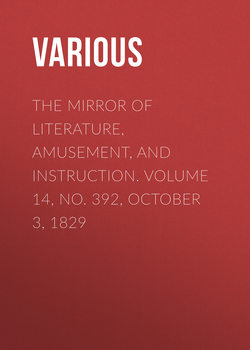The Mirror of Literature, Amusement, and Instruction. Volume 14, No. 392, October 3, 1829

Реклама. ООО «ЛитРес», ИНН: 7719571260.
Оглавление
Various. The Mirror of Literature, Amusement, and Instruction. Volume 14, No. 392, October 3, 1829
The Duke's Theatre, Dorset Gardens
FOUR SONNETS
SPRING
SUMMER
AUTUMN
WINTER
EXERCISE, AIR, AND SLEEP
THE NOVELIST
AN INCIDENT AT FONDI
TIME
SEPULCHRAL ENIGMA
CANON
THE VINE—A FRAGMENT
THE COSMOPOLITE
ON LIBERTY
REVENGE
THE NATURALIST
THE FLYING DRAGON
COCHINEAL TRANSPLANTED TO JAVA
BEES' NESTS
SPIRIT OF THE PUBLIC JOURNALS
ASSASSINATION OF MAJOR LAING
A COFFEE-ROOM CHARACTER
NOTES OF A READER
THE ANNUALS FOR 1830
THE GOOSE
TURKEY
GEORGIAN WINE
HISTORICAL FIDELITY
DRESS
THE GATHERER
JACK SHEPPARD
EPITAPH
A HOLY HERMIT
BUNGLING TRANSLATION
VERY BAD
IMPROMPTU
LIMBIRD'S EDITIONS
Отрывок из книги
The above theatre was erected in the year 1671, about a century after the regular establishment of theatres in England. It rose in what may be called the brazen age of the Drama, when the prosecutions of the Puritans had just ceased, and legitimacy and licentiousness danced into the theatre hand in hand. At the Restoration, the few players who had not fallen in the wars or died of poverty, assembled under the banner of Sir William Davenant, at the Red Bull Theatre. Rhodes, a bookseller, at the same time, fitted up the Cockpit in Drury Lane, where he formed a company of entirely new performers. This was in 1659, when Rhodes's two apprentices, Betterton and Kynaston, were the stars. These companies afterwards united, and were called the Duke's Company. About the same time, Killigrew, that eternal caterer for good things, collected together a few of the old actors who were honoured with the title of the "King's Company," or "His Majesty's Servants," which distinction is preserved by the Drury Lane Company, to the present day, and is inherited from Killigrew, who built and opened the first theatre in Drury Lane, in 1663. In 1662, Sir William Davenant obtained a patent for building "the Duke's Theatre," in Little Lincoln's Inn Fields, which he opened with the play of "the Siege of Rhodes," written by himself. The above company performed here till 1671, when another "Duke's Theatre." was built in Dorset Gardens,1 by Sir Christopher Wren, in a similar style of architecture to that in Lincoln's Inn Fields. The company removed thither, November 9, in the same year, and continued performing till the union of the Duke and the King's Companies, in 1682; and performances were continued occasionally here until 1697. The building was demolished about April, 1709, and the site is now occupied by the works of a Gas Light Company.
The Duke's Theatre, as the engraving shows, had a handsome front towards the river, with a landing-place for visiters by water, a fashion which prevailed in the early age of the Drama, if we may credit the assertion of Taylor, the water poet, that about the year 1596, the number of watermen maintained by conveying persons to the theatres on the banks of the Thames, was not less than 40,000, showing a love of the drama at that early period which is very extraordinary.2 All we have left of this aquatic rage is a solitary boat now and then skimming and scraping to Vauxhall Gardens.
.....
Pepys speaks of Harris, in his interesting Diary as "growing very proud, and demanding 20l. for himself extraordinary more than Betterton, or any body else, upon every new play, and 10l. upon every revive; which, with other things, Sir William Davenant would not give him, and so he swore he would never act there more, in expectation of his being received in the other house;" (this was in 1663, at the Duke's Theatre in Lincoln's Inn Fields.) "He tells me that the fellow grew very proud of late, the King and every body else crying him up so high," &c. Poor Sir William, he must have been as much worried and vexed as Mr. Ebers with the Operatics, or any Covent Garden manager, in our time; whose days and nights are not very serene, although passed among the stars,
In one of Pepys's notices of Hart, he tells us "It pleased us mightily to see the natural affection of a poor woman, the mother of one of the children brought upon the stage; the child crying, she, by force, got upon the stage, and took up her child, and carried it away off the stage from Hart." This pleasant playgoer likewise says, in 1667-8, "when I began first to be able to bestow a play on myself, I do not remember that I saw so many by half of the ordinary prentices and mean people in the pit at 2s. 6d. a-piece as now; I going for several years no higher than the 12d. and then the 18d. places, though I strained hard to go in then when I did; so much the vanity and prodigality of the age is to be observed in this particular."
.....